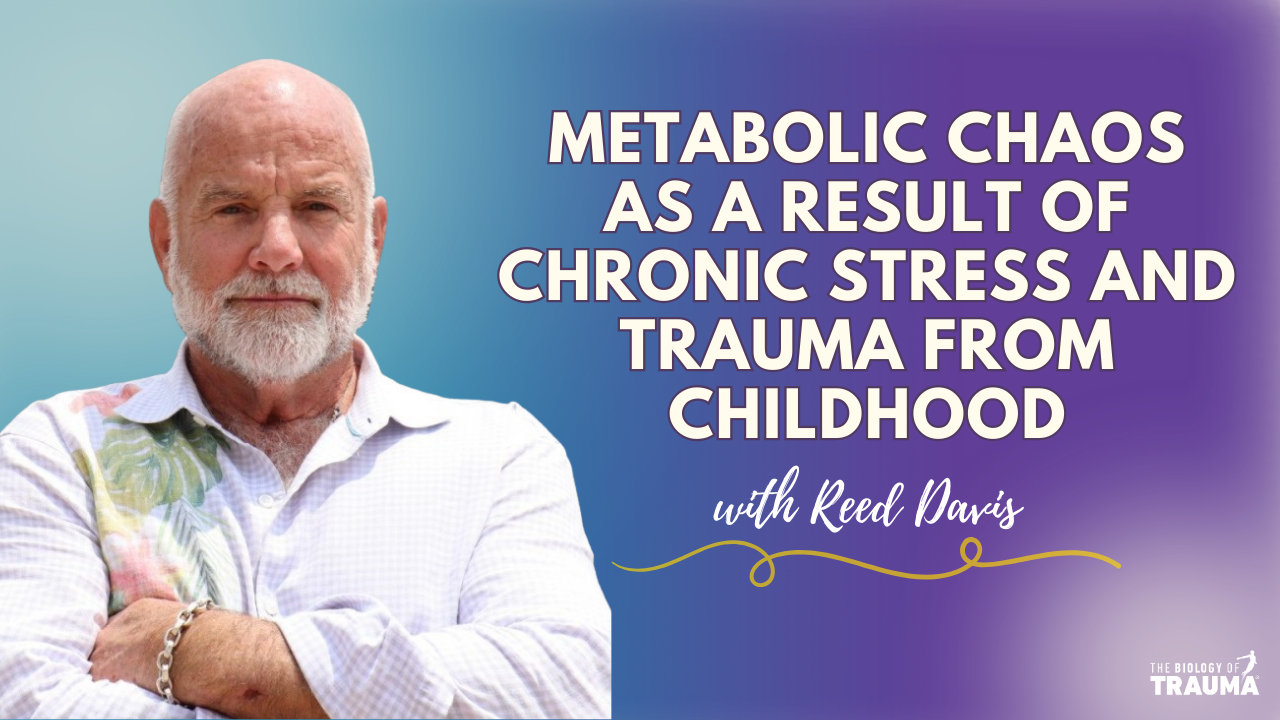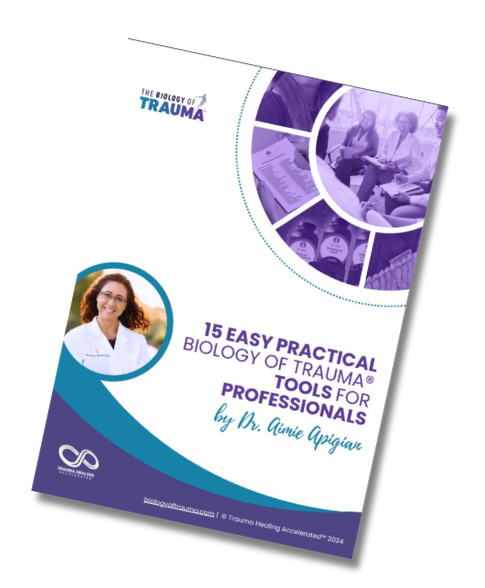Attachment and Chronic Illness





Attachment and IBS
Training of Advanced Professional Students with Dr. Aimie
You will learn:
- The connection between early childhood experiences and neurodevelopment, and how experiences of terror in infancy can shape the autonomic nervous system
- The link between childhood trauma, irritable bowel syndrome (IBS), and how a chronically activated sympathetic nervous system can lead to IBS symptoms
- How global high intensity activation (GHIA) from early life trauma can result in hypersensitivity, hyperreactivity, and the cycling between sympathetic and parasympathetic states seen in IBS
- Strategies for regulating reactivity in IBS through somatic work, parts work, and biology work personalized for each individual
- How to help people with IBS manage stress and feel safe through micro-dosing safety and focusing somatic exercises on the gut
Want unlimited access to all summit content?
Watch at your own pace, dive deep into expert sessions, and unlock ongoing access to exclusive materials. Don't miss out—click below to explore your options!
Upgrade Here00
DAYS
00
HOURS
00
MINS
00
SECS
Metabolic Chaos as a Result of Chronic Stress and
Trauma from Childhood
Interview with Reed Davis
You will learn:
- How early life stress and trauma can affect your nervous system and lead to metabolic chaos as an adult
- The importance of identifying underlying root causes through comprehensive testing rather than just treating symptoms
- How mental, emotional, physical, chemical, and environmental factors can all contribute to health issues
- A holistic framework for assessing bodily systems and identifying imbalances
- Natural lifestyle approaches like diet, rest, exercise, and stress management for achieving physical and mental health
- A step-by-step process for addressing metabolic chaos through dietary changes, supplements, and lifestyle modifications
- The 3 phases of relief care, correction, and maintenance when healing from metabolic issues
Want unlimited access to all summit content?
Watch at your own pace, dive deep into expert sessions, and unlock ongoing access to exclusive materials. Don't miss out—click below to explore your options!
Upgrade Here00
DAYS
00
HOURS
00
MINS
00
SECS
Attachment, Childhood, Chronic Fatigue
Interview with Alex Howard
You will learn:
-
How attachment styles impact nervous system regulation and the perception of safety
-
How childhood experiences can activate a stress response system in the nervous system long-term
-
Different attachment styles and their impact on relationships and ability to self-regulate
-
How meeting core emotional needs of safety, boundaries, and love impacts attachment style
-
Connection between attachment style, nervous system regulation and common symptoms like fatigue
-
Role of mitochondria in energy production and danger signaling in response to dysregulated nervous system
-
Impact of coping mechanisms on perpetuating cycles of suffering and draining mental and physical energy
-
Research showing chronic stress inhibits the body's natural capacity for healing and recovery
-
Possibility of changing attachment styles by healing the nervous system rather than just changing behaviors
Want unlimited access to all summit content?
Watch at your own pace, dive deep into expert sessions, and unlock ongoing access to exclusive materials. Don't miss out—click below to explore your options!
Upgrade Here00
DAYS
00
HOURS
00
MINS
00
SECS
6 Attachment Pains and Their Common Health Issues
Attachment Module Training with Dr. Aimie
You will learn:
- The six unique types of attachment pain and how they impact health and relationships
- How early childhood attachment affects adult behavior, emotions, thoughts, coping mechanisms, and health
- The importance of regulation and proper attachment in infancy for developing trust and secure attachments
- How lack of movement and attunement can hinder infants' ability to regulate themselves and form secure attachments
- Key aspects of early childhood neurodevelopment like tummy time, eye contact and sensory integration
- How unmet attachment needs can impact self-worth, behaviors and physical health conditions
- Adaptations developed from attachment pains and insights they provide into childhood experiences
- Integrating parts work, somatic work, neurodevelopment and biology to address attachment pains and rewire early programming
00
DAYS
00
HOURS
00
MINS
00
SECS
Parts and Chronic Illness
Interview with Richard Schwartz
You will learn:
- The three essential pillars for healing from trauma and chronic illness: body (somatic work), thoughts and beliefs (parts work), and biology
- How parts work influences biology and the interactions between the different pillars
- The concept of "parts" in therapy and how it can be applied to physical health symptoms
- How parts of the self can develop to cope with past trauma and use illness to get needs met
- How internal conflicts between protectors and caretakers parts can lead to exhaustion and dysregulation
- Advice for addressing client sabotage and non-compliance by engaging with their parts
- How parts work therapy has been shown to improve physical health conditions like rheumatoid arthritis
- Strategies for exploring your own parts and symptoms to better understand chronic illness
Want unlimited access to all summit content?
Watch at your own pace, dive deep into expert sessions, and unlock ongoing access to exclusive materials. Don't miss out—click below to explore your options!
Upgrade Here00
DAYS
00
HOURS
00
MINS
00
SECS
A Compilation of Success Stories
Want unlimited access to all summit content?
Watch at your own pace, dive deep into expert sessions, and unlock ongoing access to exclusive materials.
Don't miss out—click below to explore your options!
UPGRADE HERE00
DAYS
00
HOURS
00
MINS
00
SECS
COLLECT YOUR HANDOUT HERE:
15 Biology of Trauma® Tools
YOUR BIOLOGY OF TRAUMA® HOST:
Dr. Aimie Apigian
Dr. Aimie is a double Board-Certified medical physician who specializes in trauma, attachment, addictions and addressing trauma on a cellular level. She earned her medical degree at Loma Linda University and has a Masters in Biochemistry as well as a Masters in Public Health. She trained for three years as a general surgeon before changing her career path.
In addition to her medical studies, Dr. Aimie has studied with and participated in Dr. Allan Schore’s Attachment Regulation Theory Study Group. She is a highly-trained somatic experiencing practitioner, trained in NeuroAffective Touch™, Internal Family Systems (Parts Work) and the Instinctual Trauma Response Model™. She continues to attend advanced trainings in Somatic Experiencing™ with Dr. Peter Levine and acts as an editor for Somatic Experiencing International.
She is not one to sit back and talk about problems. She is a solution-focused action taker- always looking for ways to improve our current method and accelerate the healing journey back to our best health and our best selves.




